With three neighborhood food pantries serving more than 800 Richmond District residents each week, a home delivered grocery program that reaches 150 seniors, and a CalFresh application assistance program, The Richmond Neighborhood Center is one of our largest Community Partners.
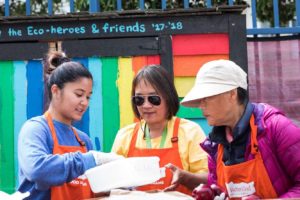 Before COVID-19, The Richmond Neighborhood Center created a thriving community around its food programs. Pantry volunteer shifts created an atmosphere similar to a family gathering. Even among the participants, weekly pantries were a place to gather and catch up with one another. And with Home Delivered Groceries, the volunteers and seniors were paired individually to have a chance to get to know each other and build a long-term relationship.
Before COVID-19, The Richmond Neighborhood Center created a thriving community around its food programs. Pantry volunteer shifts created an atmosphere similar to a family gathering. Even among the participants, weekly pantries were a place to gather and catch up with one another. And with Home Delivered Groceries, the volunteers and seniors were paired individually to have a chance to get to know each other and build a long-term relationship.
COVID-19 changed all of that. While The Richmond Neighborhood Center remained open and continues to serve their community, they had to shift the way they operate. We caught up with Program Manager Yves Xavier, to hear more about how things are going now.
(This conversation was edited for length and clarity.)
Food Bank: How have the last few months been for The Richmond Neighborhood Center?
Yves Xavier: They’ve been going well. The first three weeks of the shelter in place ordinance were pretty zany for lots of reasons. I think we were all a little nervous for our own health. We had to quickly redesign our programs to meet these constantly changing guidelines. Every day it seemed like there was either a new guideline or fear of what this pandemic could bring. So, those first three weeks were tough, but we adjusted and reshaped all our programs.
Specifically, for the pantry, we made quick changes that we wish we didn’t have to make but certainly were better for health. For example, one of the coolest pantry experiences, or at least what we really love about our pantry, is that people from the neighborhood gather together. You make friends or you come over with your friends to sit and talk and wait for your group to line up. Unfortunately, with the pandemic, we had to get rid of all of that.
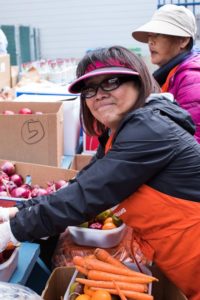
FB: How is volunteer recruitment?
YX: It was a really cool, unexpected shift – for both home delivered groceries and the pantry, we lost probably half of our regular volunteers. But within a day or two, we had a huge influx of new people from the neighborhood. So, our volunteer corps has been strong since the pandemic began. There just seems to be an outpouring of people who want to help, even though there was a large loss at the same time.
FB: One of your pantries was at George Peabody Elementary. Do you still have access to the school?
YX: Unfortunately, no. We don’t have access to the school, so we moved our pantry operations to The Neighborhood Center. We still run three pantries, but we saw a decrease in participation from participants who lived in the Inner Richmond for lots of reasons – including the fear of getting on a bus, buses not running etc. – who couldn’t make it out to our 30th Avenue Outer Richmond headquarters to get their food. But the Food Bank has helped us deliver to many of them through Pantry at Home.
We’ve also been slowly recruiting volunteers to take over those deliveries. We’re up to making 105 deliveries on our own and we’re hoping to take over all the deliveries to free your staff up to serve more people in the city who need it.
FB: Are you serving more people now?
YX: We’ve definitely seen an increase in participants, but it was similar to the way that the volunteer corps worked. There were some folks in our pantries who stopped attending. And then we also saw an influx of new people. We didn’t talk to everyone about the reasons for coming, but we took a general poll of those in line and heard from many new people who lost jobs their recently.
FB: Aside from the pantries, how has the rest of your programming been going?
YX: Our grocery delivery programs that we do in partnership with the Food Bank and the Richmond Senior Center have carried on. We took about 25 people off our waitlist and served them. It stretches us a bit thin, but it is doable. So that program hasn’t been impacted in a negative way.
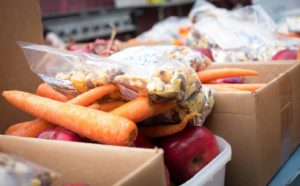
But changes had to be made. One of the things that made our home delivery so unique is we did a one to one volunteer match – one volunteer goes to one senior and it’s the same senior and the same volunteer each week. We have seen really cool relationships grow out of that where people get connected and just go over for other things like helping their senior change light bulbs, shop for them, or take them to a doctor’s appointment. There are endless stories like that. But COVID-19 has made people get creative in the way they connect. We stopped asking volunteers to connect in person. Instead, we’re asking people leave bags in front of doors, ring the doorbell, stand six feet away, and wave.
That hasn’t felt great because that social connection is such an important piece of the program. But the bottom line is people are continuing to get their groceries every week. And that’s what we really wanted to make sure is continuing to happen. We’ve encouraged our volunteers to make calls to their seniors, or teach them how to use Zoom, or write emails and pen pal letters. So, folks have been creative, but it’s definitely been a change.
We also saw a huge increase in CalFresh application assistance – more than any other time in my five years working with the food programs at The Neighborhood Center. Now we are taking as many as six appointments a day, which is pretty significant.
FB: How are you planning to adapt programming as the city reopens? Do you anticipate new challenges?
YX: It’s a really good question. I can’t say we’ve thought about it as much as would probably be helpful, but that’s partly because we’re pretty much set on keeping things the way they are for the foreseeable future. Even as things start to reopen throughout the city, we’re not expecting to change much. We’re going to keep people lining up, disallowing congregating, ensuring that everyone is wearing masks, pre-packing bags for participants, etc., until phase four, when mass gatherings are allowed again by the city.
FB: That makes a lot of sense. Was there anything else that you wanted to share about how you’ve adapted to COVID-19?
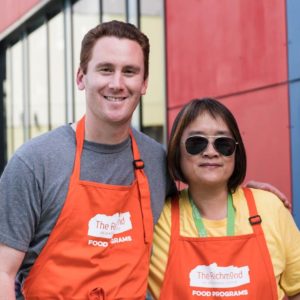
YX: I’m just really impressed by everybody who helps make these partnerships happen. Our staff and volunteers have been incredible with all their flexibility and dedication. Same goes for the Food Bank staff. Gary, our point person for the pantry, is always professional and friendly. During a difficult time, he was great – always keeping us up to date, helping make sure that we had what we needed, and just overall supportive; as was Jillian who supported us with Home Delivered Groceries.
I’m also impressed with how everything shifted for everyone across the city who does these programs and how people can keep a positive attitude, keep the collaboration going, and work really hard to serve more people and get creative. It’s been really cool to see all that happen.
One of the coolest pantry experiences, or at least the thing we really love about our pantry, is that people from the neighborhood gather. You make friends or you come over with your friends and you sit and talk and wait for your group to line up. Unfortunately, with the pandemic, we had to get rid of all of that.
Show Your Support
Learn more about The Richmond Neighborhood Center and support its food programs.
Learn More
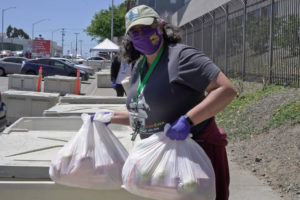 “I miss being at the library, but I recognize that it’s important for me to be here,” said Pauline.
“I miss being at the library, but I recognize that it’s important for me to be here,” said Pauline.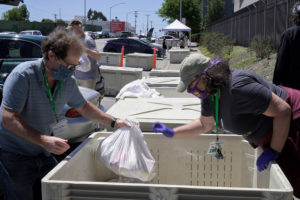 Now on her second deployment, she is assisting volunteers who are delivering groceries through Pantry at Home to over 12,000 seniors each week. At the curb on Pennsylvania Ave, outside of the Food Bank, the volunteers pick up the packed grocery bags that are ready for delivery. Here, Pauline greets them and helps pack about 15 grocery bags into their car, and at times hears stories about the people they deliver to.
Now on her second deployment, she is assisting volunteers who are delivering groceries through Pantry at Home to over 12,000 seniors each week. At the curb on Pennsylvania Ave, outside of the Food Bank, the volunteers pick up the packed grocery bags that are ready for delivery. Here, Pauline greets them and helps pack about 15 grocery bags into their car, and at times hears stories about the people they deliver to. 


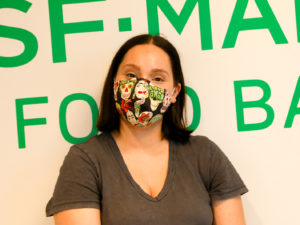 Growing up in San Francisco, my grandmother was everything to me. She had migrated from Nicaragua, re-married into a food family, and helped run a restaurant. So, she knew how to cook, and prepared meals for us regularly. Her kitchen was the epicenter of our family.
Growing up in San Francisco, my grandmother was everything to me. She had migrated from Nicaragua, re-married into a food family, and helped run a restaurant. So, she knew how to cook, and prepared meals for us regularly. Her kitchen was the epicenter of our family.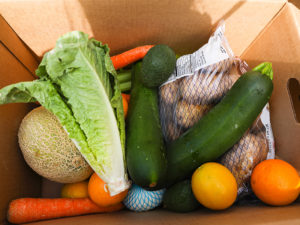 Since COVID-19 struck, the music and hugs have taken a pause, but the welcoming atmosphere has not. In Marin, we’ve changed many of our operations to drive-thru pantries. Folks drive up, open up their trunks, and a volunteer puts their groceries in. It’s a “no-touch” experience, but you can still see everyone smiling beneath their masks.
Since COVID-19 struck, the music and hugs have taken a pause, but the welcoming atmosphere has not. In Marin, we’ve changed many of our operations to drive-thru pantries. Folks drive up, open up their trunks, and a volunteer puts their groceries in. It’s a “no-touch” experience, but you can still see everyone smiling beneath their masks.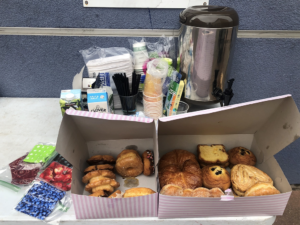 So, o
So, o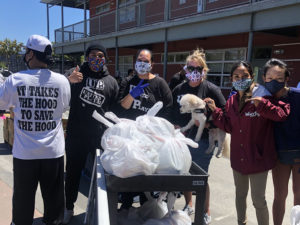 SW
SW Growing up, there was a time our kitchen cabinets were filled with blue and white generic brand food. I didn’t know my family was going through a hard time and that generic was the cheaper option. All I knew was that we had plenty.
Growing up, there was a time our kitchen cabinets were filled with blue and white generic brand food. I didn’t know my family was going through a hard time and that generic was the cheaper option. All I knew was that we had plenty.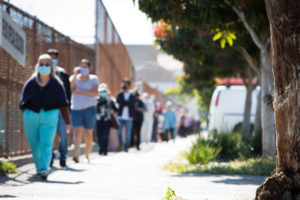 After an hour and thirty minutes, I finally saw them coming around the corner to enter the distribution area. They were both smiling under their masks and still holding hands as they seemed to cross the finish line together. It warmed my heart, and I couldn’t help but clap and say, ‘You made it! Good job!” The little boy gave me a thumbs up. It was a beautiful thing to see him unaware of the long line he waited in for the food they needed.
After an hour and thirty minutes, I finally saw them coming around the corner to enter the distribution area. They were both smiling under their masks and still holding hands as they seemed to cross the finish line together. It warmed my heart, and I couldn’t help but clap and say, ‘You made it! Good job!” The little boy gave me a thumbs up. It was a beautiful thing to see him unaware of the long line he waited in for the food they needed.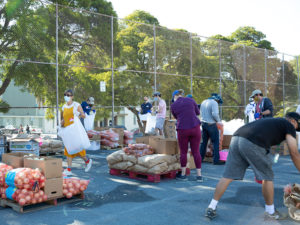 Every Tuesday, volunteer Ruthanne McCunn arrives
Every Tuesday, volunteer Ruthanne McCunn arrives 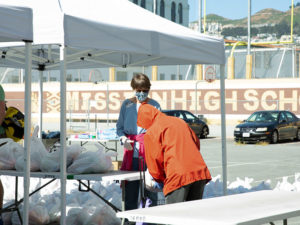 “I’ve known about the Food Bank for many years,” said Ruthanne.
“I’ve known about the Food Bank for many years,” said Ruthanne.  Before COVID-19, The Richmond Neighborhood Center created a thriving community around its food programs. Pantry volunteer shifts created an atmosphere similar to a family gathering. Even among the participants, weekly pantries were a place to gather and catch up with one another. And with
Before COVID-19, The Richmond Neighborhood Center created a thriving community around its food programs. Pantry volunteer shifts created an atmosphere similar to a family gathering. Even among the participants, weekly pantries were a place to gather and catch up with one another. And with 


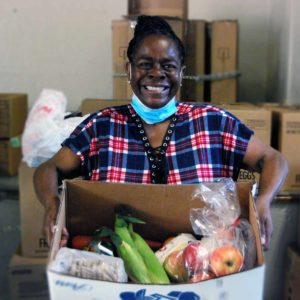 “We always try to have extra bags if people come late, or if they didn’t know about the pantry,” said Mary Ann Pikes, who is one of the volunteer leaders who has come since 2012. “It’s amazing how many people who live here never knew about the pantry. But I can understand, it’s because they were working every day.”
“We always try to have extra bags if people come late, or if they didn’t know about the pantry,” said Mary Ann Pikes, who is one of the volunteer leaders who has come since 2012. “It’s amazing how many people who live here never knew about the pantry. But I can understand, it’s because they were working every day.”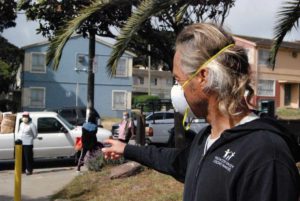
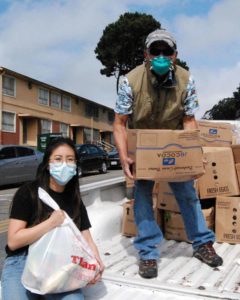
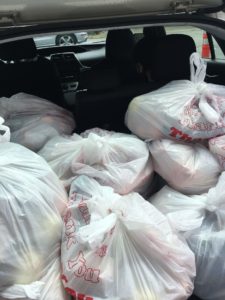 Esther Honda: We started volunteering once shelter-in-place started. I knew I wanted our family to volunteer at the Food Bank, and it just worked out well for us to deliver groceries. I have to confess that it seemed like a good excuse to get out of the house but also felt really necessary to help others who could not safely leave home.
Esther Honda: We started volunteering once shelter-in-place started. I knew I wanted our family to volunteer at the Food Bank, and it just worked out well for us to deliver groceries. I have to confess that it seemed like a good excuse to get out of the house but also felt really necessary to help others who could not safely leave home.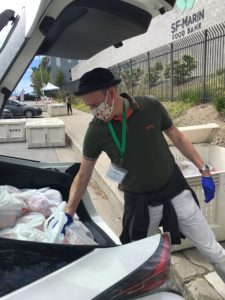
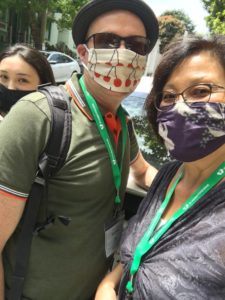
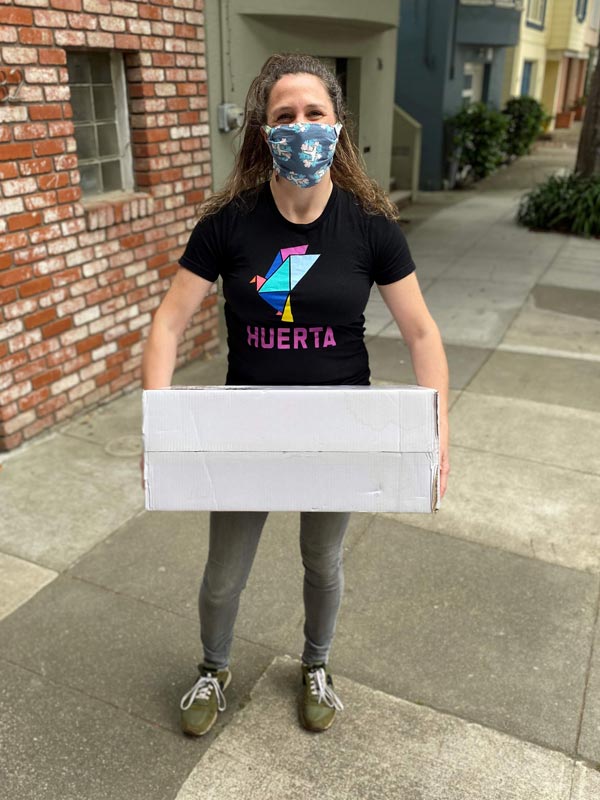
Share